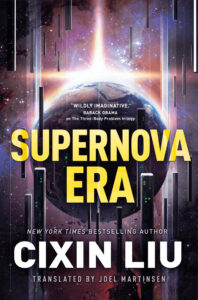Book review: Supernova Era by Cixin Liu

I am one of the many science fiction fans who enjoyed Cixin Liu’s Remembrance of Earth’s Past trilogy, though I won’t give it an unreserved recommendation. I’ve also read some of his short fiction, with similar feelings. So when I came across Supernova Era in a used book store, I figured “What the heck?” and bought it.
For the tl;dr, the bottom line that This is a terrible book.
I found the general setup fairly intriguing: What if a burst of radiation from a supernova killed off all the adults, leaving behind a world populated only by children? This is an interesting question, and obviously reminds me of the Star Trek episode called “Miri.” The first quarter or so of Supernova Era sets up this situation and the ramping up of plans to deal with it.
From there on, it’s all downhill. While the characterization in the first section of the book was somewhat sketchy, you could relate to some of the characters, even when they were doing things that didn’t really make sense. As an American reader who has spent a lot of time in China, I’m aware that there are cultural differences in both how people act and how readers (and writers) expect characters to be portrayed in fiction. But if I’m constantly thinking, “Wait, why would anyone do that?” I begin to think that it’s more than just cultural differences at play.
Spoilers from here on out
To start out with, let’s examine the scenario as a whole. It’s somewhat implausible that a burst of radiation would result in a condition that kills adults but leaves children alive. I can live with that as part of the suspension of disbelief involved in all science fiction. But I think Liu could have made it a lot more believable by taking into account some simple principles of nature. Natural phenomena don’t have hard boundaries, like something that would kill everyone over the age of 13. People grow and develop at different rates, so it should be a bell curve, with maybe a few people as young as 10 dying and some as old as 14 or 15 surviving. And having all of the adults die on essentially the same day… what?!? Again, a bell curve would have been more sensible, with some people starting to die a few weeks after the exposure, and others lasting for several years. Adding this kind of detail would not necessarily have changed anything with the plot.
Next, there’s the reaction of the world’s adults to the situation. This part of the story is set in China, and I can believe that the Chinese government might act as described, searching for the most capable children in various disciplines, setting up a training program for the oldest of the kids, and working to provide a somewhat orderly hand-off. But the whole question of the rest of the world is brushed aside. I can’t believe for a second that every country in the world would agree to any plan of action. I can’t even believe that every country in the world would accept the conclusion of the scientists that the adults were going to die. And I certainly can’t believe that the entire population of every nation would go along with any plans their leaders put forth. In a world where there are people who believe the Earth is flat, reptilian aliens have infiltrated our governments, or vaccines contain microchips, do you really think there wouldn’t be scores of denialists and riots in the streets?
It actually gets worse from there, but I won’t go on. One of Liu’s points, which is explicitly stated by a character late in the book, is that we have a romanticized vision of children as innocent and needing to be taught to hate and harm others, when in fact children are by nature cruel and completely lacking in empathy, with no regard for the value of life. So when they inherit the world without the benefit of adult supervision, it shouldn’t surprise us that they invent countless games that result in widespread death and destruction. “Let’s play cops and robbers with real guns!” — “Yay! Great idea!” — Bang! — “Ow! I’m dying, well it was fun while it last—” — “Oh, Billy’s bleeding all over. Whatever, where did Sally go?”
I’ve seen enough kids playing to feel like that’s just not a likely thing. Obviously — bell curve — there’s going to be a range of behaviors, but most kids would rather build something with Lego or pretend their stuffed animals are doctors than watch each other scream and bleed to death.
I’ve spent some time thinking about whether my assessment that this is a terrible book is based solely on my disagreement with this premise, and I don’t think it is. Liu doesn’t seem to have spent much time thinking about the practicalities of his situation, how the children will eat, get around, and handle sickness and injuries. There’s some mention of kids dying in the hospitals, which are now staffed with other kids who have only had a crash course in medical basics, but would they really be able to get by on preserved foods once they all decide that the work of producing food is boring?
Bottom line: I don’t know if it would be possible to write a good book on this scenario, but Supernova Era definitely isn’t it.